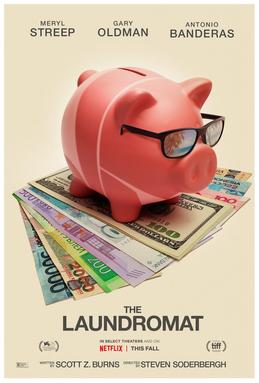
When the trailer dropped for The Laundromat it was hard to tell what the largest surprise was: That it was a Steven Soderbergh film made for Netflix, that it starred Gary Oldman, Meryl Streep, Antonio Banderas, Robert Patrick, David Schwimmer and more, or the crazy Dana Carvey-as-Hans (of SNL Hans and Franz fame) accent Oldman was working. Based on the Panama Papers, a scandal which exposed numerous celebrities and toppled several world leaders, The Laundromat attempts to explain the internecine and opaque world of off-shore shell corporations used for tax avoidance by the well-heeled and sometimes downright criminal element.
It opens with Meryl Streep and her husband (James Cromwell) setting off on a lake boat tour based on an actual accident when a rogue wave capsized the boat, killing 21 passengers. Presumably the tour operator's liability insurance would've covered the settlement, but due to a messy web of re-insurance companies and shell entities, it turns out there was no coverage.
Since her husband had provided sufficient life insurance to supplement the meager settlement, Streep plans to buy a Las Vegas condo overlooking the spot where she'd met her husband. But that is snatched away when the agent (Sharon Stone) informs her someone else had not only offered double the asking price, they wanted three adjoining units. Denied again, she begins to investigate how these Russians were able to swoop in and how the tour operator's insurance got so bollixed up.
The common factor is a Panamanian entity called Mossack Fonseca operated by Jürgen Mossack (Oldman) and Ramón Fonseca (Banderas), a mill which sets up shell corporations in various tax havens, utilizing "directors" who are merely secretaries or hired notaries of sketchy repute. The two serve as our narrators in some flashy visual sequences explaining concepts like money and credit.
If you're thinking this sounds like The Big Short, Adam McKay's 2015 film about the 2007-2008 financial crash which used celebrities like Anthony Bourdain, Margot Robbie, and Selena Gomez to explain arcane financial concepts in understandable terms, you'd be right, except Soderbergh and screenwriter Scott Z. Burns (who also wrote Soderbergh's Contagion, Side Effects, and The Informant!) fail to stay focused, ultimately leading to confusion and disinterest.
Instead of sticking to the relatable Streep character's quest, things go wildly astray in the 4th chapter, "Bribery 101", as we are introduced to a mega-wealthy African magnate (Nonso Anozie) living in Los Angeles whose college graduate daughter (Nikki Amuka-Bird), whom he's throwing a massive party for, catches him dallying with her roommate and best friend. In order to buy her silence, he offers her $20 million in bearer shares to a company he owns. When everything blows up with the family, she and her mother (who also got paid off by her husband) go to collect their money and discover their $20M corporations had less than $100 in the accounts. Where did the money evaporate to? We never find out.
The final chapter, "Make A Killing", is based on an actual poisoning of a businessman by a Chinese Communist Party honcho's wife involving bribes and shell companies and by this point I was thoroughly lost as to what was going on. After the last two segments, it was hard to remember what the point of this story was and what exactly Mossack Fonseca were doing and even whether they were swindlers or just enablers of these schemes.
The movie ends up on a soapbox railing against the fact that the bad part of these schemes isn't that they're illegal, but that they're LEGAL and how the politicians who instituted these laws must be pressured to change them which is adorably naive and silly especially when the movie gets very meta and mentions Soderbergh has five entities incorporated in Delaware and Burns one, a weird flex, but OK. (For all the hammering on Delaware, they conveniently leave out who the Senator from there whose cokehead loser son was given a position with the largest bank in the state while Daddy had legislation favorable to them before him.)
Despite a brisk pace, some amusing moments and good performances, The Laundromat feels like a much longer movie than its 96-minute running time would suggest. As it runs astray in its back half and loses the audience in a fog of poorly-explained concepts, it stops making sense. Why are we spending time with this rich family just to introduce the idea of bearer shares only to not explain why there were no assets left? What does the Chinese murder mean to Streep's widow? We don't know other than a vague "the system is rigged in favor of the rich at the expense of the poor" which is cheap and hypocritical bumper sticker philosophy coming from a writer-director team with a half-dozen tax dodge things between them. How about less lecture and more divestiture, fellas? Show us the way!
Score: 5/10. Skip it.






